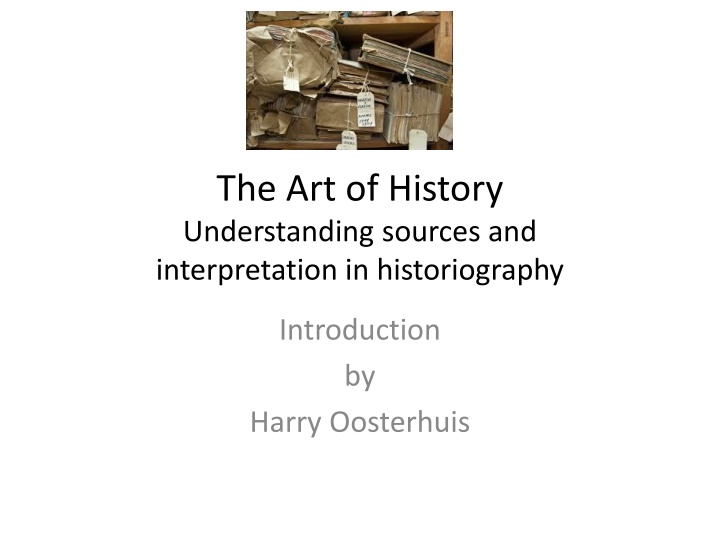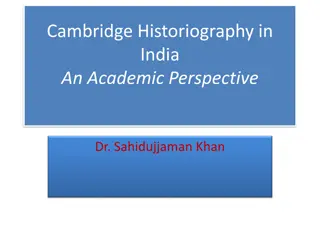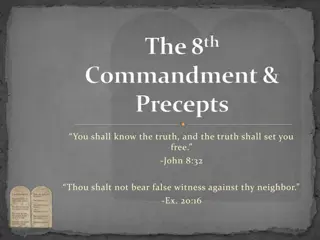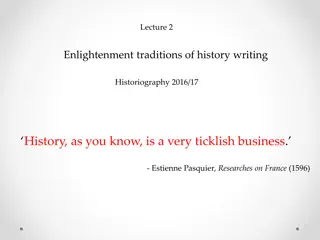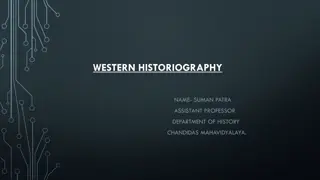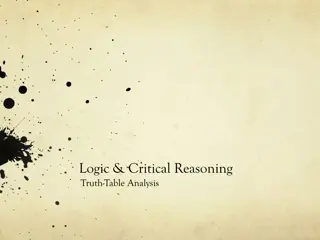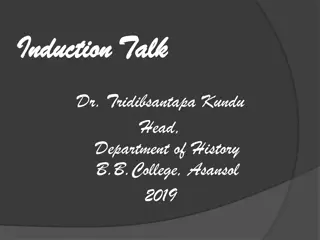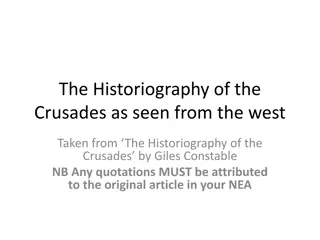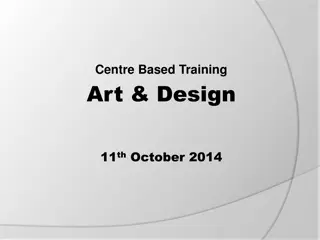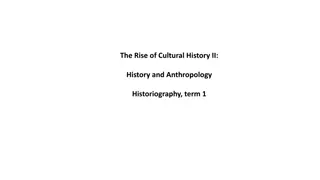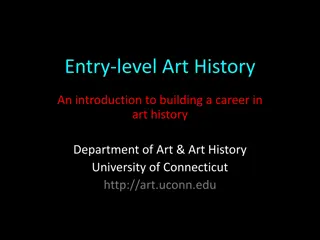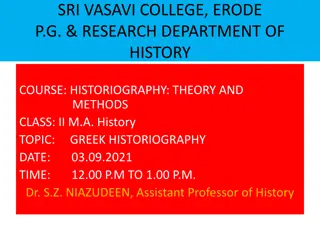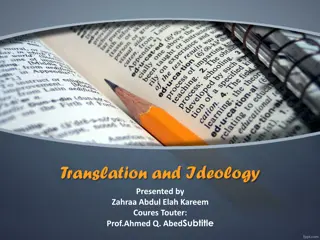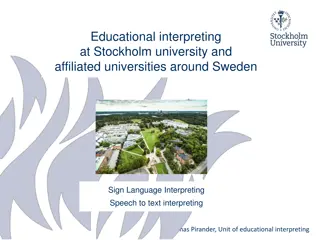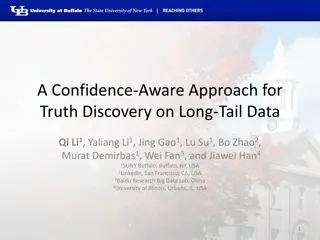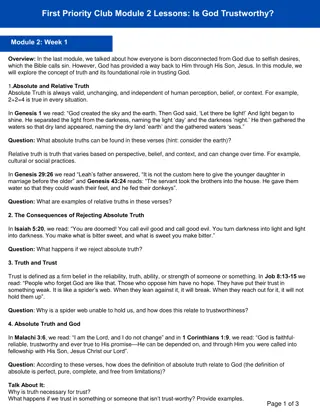The Art of History: Interpreting Sources and Truth in Historiography
Delve into the study of history, exploring the complexities of interpreting the past through available sources. Uncover the challenges of objectivity, understanding the balance between facts and interpretation amidst a backdrop of disinformation and ideological manipulation.
Download Presentation

Please find below an Image/Link to download the presentation.
The content on the website is provided AS IS for your information and personal use only. It may not be sold, licensed, or shared on other websites without obtaining consent from the author.If you encounter any issues during the download, it is possible that the publisher has removed the file from their server.
You are allowed to download the files provided on this website for personal or commercial use, subject to the condition that they are used lawfully. All files are the property of their respective owners.
The content on the website is provided AS IS for your information and personal use only. It may not be sold, licensed, or shared on other websites without obtaining consent from the author.
E N D
Presentation Transcript
The Art of History Understanding sources and interpretation in historiography Introduction by Harry Oosterhuis
What is the study of history about? Making sense of something which has vanished forever, the past, on the basis of its remnants, the sources. Twofold focus of this skills-training: 1. Making sense of the past history as interpretation 2. The study of sources the empirical method
Wider relevance in times of disinformation, fake news, alternative facts and undermining of objectivity and truth A critical attitude towards information, facts and news: what is reliable and true ? What is factual and what is interpretation? Which information is ideologically coloured or manipulated? See Daniel T. Rodgers, When Truth Becomes a Commodity , The Chronicle of Higher Education, January 15, 2017. http://www.chronicle.com/article/When-Truth-Becomes-a- Commodity/238866
Is history a science? Not according to the standards of natural science (course Knowledge and Criticism): objectivity, quantification (mathematical methods), causal patterns, deterministic natural laws, predictability.
History is different from the natural sciences Quantitative knowledge is only relevant in history to a limited extent (in social-economic history for example). History is not predictable because it is not predetermined but open. There is no regular causality in history No straight answer to questions such as: what is the cause of the French Revolution, the Industrial Revolution, or the Second World War? Answering such questions requires the study of complicated patterns of historical situations, long-term developments, social and political structures, preconditions, immediate causes and causal chains, unintended consequences, and the behaviors, interactions and motives of the people involved. We cannot experiment with the past in a laboratory, we cannot control it and directly verify our knowledge of it as scientists do with natural phenomena.
Objectivity is problematic in history Also, in the natural sciences objectivity has been put into perspective Thomas Kuhn s idea of changing paradigms: the common cognitive frameworks which determine the way scientists think and ask questions, are not fixed forever. But the study of history there is not even such a common paradigmatic framework of shared assumptions and theoretical notions that would result in some sort of agreement about what are the relevant facts, a convincing analysis and valid conclusions, as is the case in the natural sciences.
The scientification of historical research in the 19th century Before the 19th century: writing of history as narrative art, part of literature: telling stories about the past. In the 19th century the establishment of history as an academic discipline on the basis of the historical method: investigating primary sources in archives, finding out which information is reliable or not, establishing the facts and arrange them properly reconstructing the truth about the past and describe it in a realistic way. Leopold von Ranke
Writing history implies interpretation Nowadays academic historians have adopted the method of researching and criticizing sources, but they don t believe any more that this will result in an objective account of the past. Despite their sound study of sources, historians, often come up with quite different stories about the past. Facts about the past never speak for themselves, because historians may select and understand them in different ways. Based on their particular questions and perspective on the past, they make a selection of the facts that they consider relevant. Then they judge, arrange and interrelate these selected facts in specific ways, and put them into a context, thus granting them a specific significance. Several interpretative operations under the influence of value judgments, world-views, ideologies, political preferences, and historians own experience of life and the times and culture they are living in.
Historical study as interpretive construction An historical report or narrative should not be seen as a true, objective picture reflecting the reality of the past, but rather as an interpretation, as a perspective on the past because: - The truth of an historical account can never be verified directly and completely, since the past itself has gone forever. - The only standard for establishing what is true and false (or probable and improbable) about the past is the empirical evidence found in the remnants of the past: the sources. Historical sources, however, are incomplete, scattered, indirect and mediated: they do not provide absolute proof about the reality of the past. Therefore, a historical report is not a reconstruction of the past, as historians such as Von Ranke believed, but a construction and only one of the various possible constructions. (See Chris Lorenz: The construction of the past)
Why do historians have different views on the past? Because their perspective is influenced or shaped by their: norms and values, convictions world-view, religion, ideology political preferences, nationality personal experiences/involvements (personal and shared/collective) identity.
Historical study is not only about the past, but it also reflects present concerns Writing history can be very sensitive because the ways in which the history of a country, a community, a people or group is represented, involves the memory, self-image and identity of that group or nation. There is a lot of selective and wishful thinking in history as memory, in particular in times of identity politics . History as memory can touch on tender strings and it is often entangled in political controversies.
Example: The importance of the French Revolution for the national identity of the French and their republic The values of the Revolution are still a crucial reference-point: The public memory of the Revolution as the foundational moment of the French nation and democratic republic. (National celebration on 14thof July.) Upholding republican values such as laicit (strict separation between Church and state) and undivided loyalty to the nation has affected discussions about the religious identity of Muslims and their integration in French society (in particular after terrorist attacks) former president Sarkozy advocating a ban on the wearing of headscarves in public by Muslim women Here in France we only have one community and that is the nation. However, something is left out in the public memory of the French Revolution: - The many victims of revolutionary violence and terror in name of the French state and nation; - That Sarkozy s statement is in line with Robespierre s despotic interpretation of the General Will. - That the mind-set of revolutionary Jacobins and that of Muslim terrorists have something in common: radicalism and intolerance; black and white thinking; unwillingness to compromise; no respect for history, ruthless utopianism.
French national identity Here in France, we only have one community and that is the nation. ? ?
Example: German national identity infused with remorse The importance of the Third Reich, the Second World War and the Holocaust for the national identity and democratic substance of postwar Germany. Angela Merkel s asylum policies with regard to the many refugees who entered Germany in the previous years - Wir schaffen das ( We will manage this ) can be understood in the light of Germany s dark past and the associated feelings of guilt.
German national identity Wir schaffen das.
Example: Rediscovery of the importance of national history Reaction to globalization, European integration, immigration and growing ethnic and religious diversity Renewed emphasis in several Western countries on the importance of having knowledge of national history as a way to foster national identity, to find an answer to questions about what we are, where we belong to and what we have in common. What does it mean to be Dutch, British, French, German (or any other nationality)? What should unite all the different people who live in these countries? But can history answer such questions at all? Is there a story about the past with which all residents in a country can identify or are there as many stories as there are different cultural, social and religious groups? Dutch efforts to establish a Museum for National History failed because the politicians, historians, journalists and other opinion-makers involved did not agree about the story to be presented in such a museum. And if it is so difficult to agree about national history, just imagine how difficult it is to construe a European identity on the basis of a common European history.
Dutch national identity The National History Museum which did not materialize
Example: The Armenian genocide Explosive issue in Turkey and also for Turkish people living in Western Europe: the debate on whether or not the murder of hundreds of thousands Armenians during World War One in the Ottoman Empire should be called a genocide . The term genocide is felt to be insulting and considered as an attack on the Turkish nation and state. People in Turkey who speak out about this and assert that there has indeed been a genocide by the Turkish regime, have been prosecuted or some have even been killed. By contrast, in France, where many Armenians are living, a law was adopted that prohibits to deny the Armenian genocide like it is unlawful in Germany and other countries to deny the Holocaust. Recent proposal in Dutch parliament to officially recognize the Armenian genocide will affect the already troubled relations between the Netherlands and Turkey.
Turkish national identity The Armenian genocide The Kurds in Turkey
The range of historical interpretation has limits The (academic) writing of history is not on the same level as literary fiction or political propaganda. The range of historical interpretation is not endless: not any interpretation is possible and some historical interpretations are considered as better than others. Historical interpretations are only up to scholarly standards if they are validated by: Thorough knowledge of the historical canon, the existing body of generally accepted and established historical interpretations (which cannot be ignored). The requirement of empirical underpinning: a thorough and critical study of sources, which should be open to verification by other historians (on the basis of references to the sources).
Sources are not without hurdles Sources: remnants of the past (texts, but also pictures, archeologic relicts, architectural remains, and other artefacts) produced by people in the past; direct and contemporaneous products or by-products of the historical reality to which they refer and which they document. The closest to the reality of the past as an historian can get. Difficulties involved (see introduction skills-book): (1) tracing, (2) accessing, (3) selecting, (4) authenticating, (5) assessing, (6) understanding and contextualizing sources.
Sources are also interpretations Sources are not direct or objective reflections of the reality of the past and they do not have a self- evident, fixed meaning, but they are interpretations by the historical actors who produced them and as such they may be contradictory, selective, coloured, biased, and distorted. Sources have been selected by history itself: some parts of the past and some historical actors have left more traces than others.
The historian and the sources Sources are selective interpretations, and the historian has to make sense of them, has to evaluate and assess, that is again interpret, such interpretations. Many sources can be and are understood in various ways by historians. Historians may make different selections from available sources on the basis of diverse views about their significance and importance and they may relate their contents to other sources and the historical context in dissimilar ways. Sources restrict the range of possible interpretations, but they do not fully determine how historians should understand and explain the past. As long as a historical interpretation is not in flagrant contradiction with the information in sources, a source in itself cannot finally prove or refute that interpretation.
Historical knowledge: twofold interpretation Between the reality of the past and what we know about the past from what historians report about it in their publications, there is twofold selection and interpretation. As readers of historical works, we don t get direct access to the reality of the past, but we are offered a certain perspective on it, a viewpoint that has been moulded by selection and interpretation in two ways: The information in historical sources is shaped through the selection and interpretation by historical actors. Historical accounts about the past are based on selections and interpretations of the sources by their authors.
Historical knowledge: twofold interpretation The (vanished) reality of the past (1) Selection / interpretation by historical actors perspective on on the past Remnants of the past: historical sources (2) Selection / interpretation by historians The representation of the past in historical narrative/analysis
Academic history more selection, generalisation, simplification history at school the study of primary sources detailed specialist academic monographs synthesizing specialist knowledge more general academic studies simplification popular historiography and textbooks for university students more simplification school books
